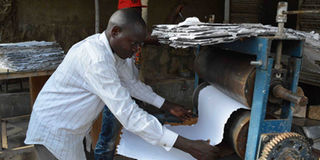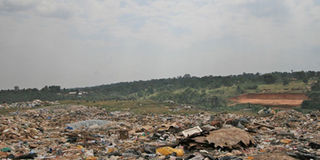When the world hands you trash, make money

Trainees Nicolas Nyesigamukama, 24 (left), and Andrew Tumusiime, 17, process handmade paper at Eco-Friendly Innovations Development Centre in Kireka, Wakiso. They are among other youths learning to turn trash into cash to earn an income. PHOTO BY JULIA BURPEE
What you need to know:
The rate of youth unemployment is high and at the same time, there is a lot of waste in the city. Some youth have combined the two problems to find a solution
With youth unemployment rates as high as 62 per cent in Uganda, according to ActionAid International, many young Ugandans are struggling to find work. Some industrious youth have been looking to landfills and litter to make money, transforming trash into briquettes, jewellery and other marketable items.
“After graduating, I had to sit for a year ... I was just there on the street, I couldn’t find a job,” said Ismail Gameje, 28, who completed a bachelor’s degree in wood science and technology at Makerere University in 2012.
“Even if they say that with science [degrees] you can easily get a job, it is not easy,” he said, challenging President Museveni’s recent remarks that studying sciences guarantees jobs and arts courses do not. The President made the comments at the launch of a Ndejje University laboratory on August 15.
Gameje argues that having connections at companies that are hiring is the “biggest challenge” youth from any educational background face when looking for work.
“If they don’t know you [at a company], you cannot easily enter there ... so most youths graduating have nothing to do,” he says.
Fortunately for enterprising youths, like Gameje, who can see past trash and towards a profit, there is no shortage of waste produced in Uganda.
The KCCA reports that 33,500 tonnes of waste is collected each month in Kampala alone, according to the authority’s public relations officer, Peter Kaujju.
“There’s actually more waste generated in the city. Some is on our streets. That [amount] is just what makes it to the [Kiteezi] landfill,” he adds.
Since March, Iganga-native, Gameje, has been turning some of the city’s trash into cash. He makes briquettes, an environmentally-friendly alternative to charcoal, and handmade paper by combining banana stems with waste paper.
How he got into it
“I just collect [banana stems and paper] from markets,” Gameje explains. “People bring matooke then they just dump stems in dustbins, on the ground, wherever, so we go and collect them and make briquettes.” He then sells the environmentally-friendly briquettes, which do not create soot or smoke, for Shs1,000 per kilogram, he says, adding that they burn three times longer than regular charcoal.
After struggling to find work for more than a year, the science graduate says he enrolled in training to learn how to turn waste into marketable items.
Locally-owned company, Eco-Friendly Innovations Development Centre, located in Kireka, Wakiso, trains youths how to combine and process banana stems and waste paper to make fibres which are then turned into briquettes or handmade paper.
The company’s owner, Godfrey Atuheire, a research officer at the Uganda Industrial Research Institute, says he has trained 30 youths, aged 17 to 30, how to replicate his technology since starting the centre in 2012.
“We have a problem of unemployment and the fact that some of us are sharing technology and information is good,” says Atuheire, explaining he has also published books outlining the techniques so he can reach a wider audience than his rural training centre allows. “I want to share information to solve the problem of unemployment.”
Within two months of starting the training, Gameje says he had already sold enough briquettes to more than cover the Shs300,000 cost of the six-month programme. “I have many customers. At an agricultural exhibition in Jinja, I raised almost Shs800,000 selling my briquettes and paper.”
Gameje says the money he makes turning trash into products is much better than when he worked as a carpenter nearly seven days a week last year. “There was a lot of suffering; you earn less, but you do so much more work ... someone can work for a month without even raising Shs160,000.” He says he’s also happy to help Kampala manage its waste.
“I just feel it’s the right way because now the KCCA doesn’t even have anywhere to put the garbage so if I put it to use, I think I’m contributing.” KCCA public relations officer, Kaujju, confirmed that the city authority is looking for new land to store the city’s excess waste.
Other youth benefitting

Youth trainees Ismail Gameje (left) and Joseph Bihuru dry banana stems to make briquettes at Eco-Friendly Innovations Development Centre in Kireka, Wakiso. Gameje says he earns significantly more money now than he did when he worked as a carpenter seven days a week. PHOTO BY JULIA BURPEE
Learning to make items out of Kampala’s trash has helped other youths escape unemployment.
Deo Segirinya is a 19-year-old who says he stopped school in Tanzania in Primary Seven because he couldn’t afford to pay the fees. Since moving to Kampala three years ago, Segirinya says he has struggled to find work. Now he works as an apprentice with another Eco-Friendly trainee, Joseph Bihuru, who also left school early. Bihuru says the pair make 2,000 briquettes a day, approximately 118 kilograms (worth Shs118,000).
“Even people with degrees, they are seated without any job so I think it is better to be here,” says Bihuru, who says he now makes good money selling his briquettes.
Twenty-three-year-old Allen Nabukenya says she also sees turning the city’s excessive trash into marketable items as a sustainable way to make money. She makes chairs, jewellery, lamp shades, shoes, and umbrellas out of garbage then sells her products to individuals, hotels and recreational centres.
She uses free discarded material to make her products then sells them for prices between Shs50,000 and Shs150,000 for shoes and Shs10,000-Shs250,000 for jewellery, she says.
“I commute from home [in Bukassa] to Kyambogo regularly so as I move out of home there are many polythene [plastic] bags I pass,” says Ms Nabukenya. Instead of ignoring the litter, she says she collects it, sometimes paying street children to help her. “I get a lot of material from the Magoba Arcade and the Kiteezi landfill.”
Nabukenya says she first thought of making products out of trash because of all the waste she saw littered in her university’s garden. “I’ve come to realise these materials - plastic bags, glass, bottles and metal bits - can be used to make art,” says the art and industrial design student who will graduate from Kyambogo University in December.
Not only is Nabukenya making money selling her items at exhibitions but her innovative waste management work has been recognised by the Kinawataka Women Initiatives (KIWOI), which has helped empower women with income-generating environmental projects since 1998.
KIWOI’s founder and executive director, Benedicta Nanyonga, has made Nabukenya chairperson of the Kinawataka Youth Development Initiative, a group of 30 youth who receive waste management and entrepreneurial training each month.
People offering training

Entrepreneur and artist, Allen Nabukenya, 23 (left), and Benedicta Nanyonga of Kinawataka Women Initiatives wear the jewellery they made out of garbage. Nabukenya uses plastic bags and Nanyonga uses plastic straws to make marketable items, which they sell at exhibitions. PHOTO BY JULIA BURPEE
For more than 15 years, Ms Nanyonga has been making shoes, bags and jewellery out of plastic straws and selling her products in Uganda, the United States, Europe and online. Her successful business and work to empower women and young Ugandans was recognized with the International Alliance for Women’s ‘World of a Difference 100 Award’ in 2014. Nanyonga advocates that more youths create prosperous businesses by making use of the waste around them.
“Use your head - think of what’s around you and how you can use it. If it’s Elephant Grass, think of what you can do with Elephant Grass. If it’s waste, think of what you can do with waste,” Nanyonga instructed the audience at a Uganda Small Scale Industries Association conference at UMA Show Grounds on Aug. 14. “I’ve been turning waste into cash for years, but there’s still potential in it.”
KCCA encourages recycling

Some residences in the area are located 10 metres from the landfill and a lot of waste was seen scattered in some homes. File photo
With Kampala’s lone landfill almost full, the KCCA says it is looking for better waste management options, according to Kaujju. “We want to go beyond the point where people see waste as waste. We want people to get value out of waste, as energy or otherwise,” he says, explaining the KCCA, partnered with the International Finance Corporation, has been accepting bids from companies that turn waste into energy, a common practice in many European countries.
As some 300,000 individuals in Uganda graduate from universities and colleges each year and enter the job market with fewer than 20 per cent of them finding formal work, according to a 2013 report by the World Bank, the best waste management plan might be encouraging more youths to turn trash into cash and tackle two tough issues at once.




